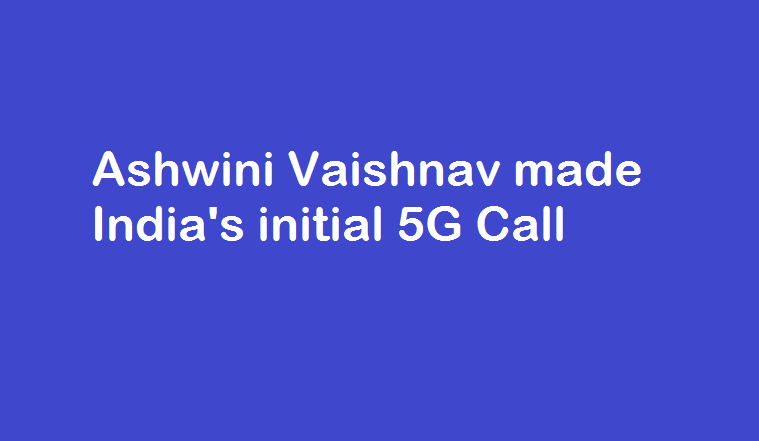Ashwini Vaishnav is India’s current Minister of Railways, Communications, and Electronics & Information Technology. He was appointed to this position in July 2021 as part of a cabinet reshuffle by Prime Minister Narendra Modi. Before his appointment, Vaishnav served as a member of the Rajya Sabha (upper house of the Indian Parliament) from Odisha.
Before entering politics, Vaishnav had a successful career in the private sector. He worked for companies like General Electric and Siemens before joining the US-based investment firm Blackstone Group as a managing director. He returned to India in 2012 to become an entrepreneur and co-founded two startups – MyFirstCheque and Daksh eServices.
In addition to his role in government, Ashwini Vaishnav made headlines on The Economic Times Industry when he made India’s first 5G call on July 15, 2021. The call was made from an Ericsson lab using equipment that will be used for India’s upcoming 5G network trials. This move is a significant step towards establishing India’s position in the global race towards adopting next-generation wireless technology.
The significance of India’s initial 5G call
The significance of India’s initial 5G call must be considered. With this milestone, India has demonstrated its commitment to becoming a leader in the global digital landscape. Introducing 5G technology will transform many industries, including healthcare, transportation, and manufacturing.
Furthermore, developing 5G infrastructure will facilitate the expansion of other technologies, such as artificial intelligence and machine learning. This will enable businesses to streamline their operations and improve productivity. Additionally, the increased speed and capacity of 5G networks will allow for more seamless communication between devices, allowing them to share large amounts of data in real-time.
Overall, India’s initial 5G call is a significant step forward in technological advancement. It signals a new era of innovation and growth that has the potential to benefit not just India but also the rest of the world. As more countries begin rolling out their own 5G networks, it is clear that this technology has become an essential component of modern society.
As India gears up to introduce 5G technology, Ashwini Vaishnav’s contribution cannot be ignored. As the Minister of Electronics and Information Technology, Vaishnav has been instrumental in shaping the country’s digital roadmap. His leadership has enabled India to take a significant step toward achieving its Digital India vision.
Vaishnav’s role in making India’s first-ever 5G call is an important milestone for the country. It highlights his commitment to ensuring India remains at the forefront of technological innovation and development. His efforts have driven growth and created new opportunities for businesses and individuals.
The introduction of 5G technology will transform healthcare, finance, education, and entertainment industries and improve connectivity across rural areas. Vaishnav’s dedication to realizing this vision has set a strong foundation for future generations to build upon. With his guidance, India is poised to become a global leader in digitization and technological advancement.
Vaishnav’s vision for a digitally connected India centers around the idea that technology can revolutionize how citizens interact with each other and the government. One of his main goals is to ensure that rural areas have access to affordable and high-speed internet, enabling them to take advantage of digital services like e-commerce, telemedicine, and online education. He also believes that digitization can help reduce corruption in public services by making them more transparent and accountable.
To achieve these goals, Vaishnav has been pushing for policies that promote investment in digital infrastructure, such as 5G networks and fiber optic cables. He has also emphasized cybersecurity’s importance in protecting against cyber threats and data breaches. Additionally, Vaishnav has advocated for using emerging technologies like artificial intelligence (AI) and blockchain to improve governance and public service delivery.
Vaishnav’s vision for a digitally connected India is ambitious but necessary in an increasingly digital world. By investing in digital infrastructure and embracing innovative technologies, India can position itself as a leader in the global tech industry while improving the lives of its citizens.
Aside from making India’s initial 5G call, Ashwini Vaishnav has had many notable achievements in his career. He was a key team member that developed the Unique Identification Authority of India (UIDAI), responsible for issuing Aadhaar cards to Indian citizens. The Aadhaar card is a unique identification number for accessing government benefits and services.
In addition, Vaishnav played a major role in implementing the National Optical Fibre Network (NOFN), which aimed to provide high-speed internet connectivity to rural areas across India. This project was later rebranded as BharatNet and continues to be an important initiative in bridging the digital divide in the country.
Furthermore, Vaishnav has held various leadership positions at global technology companies such as Siemens and General Electric. He also holds multiple patents related to wireless communication technologies. Overall, Ashwini Vaishnav’s contributions have been instrumental in shaping India’s technological landscape and improving access to information and services for millions of people across the country.
Read Also: rajkotupdates.news:covid-vaccine-record-india-2-billion-doses-of-covid-vaccine-in-just-18-months

